Once little more than jumble sales, flea markets have been reconstructed in recent years to become veritable mini-festivals. So which are Europe’s coolest?
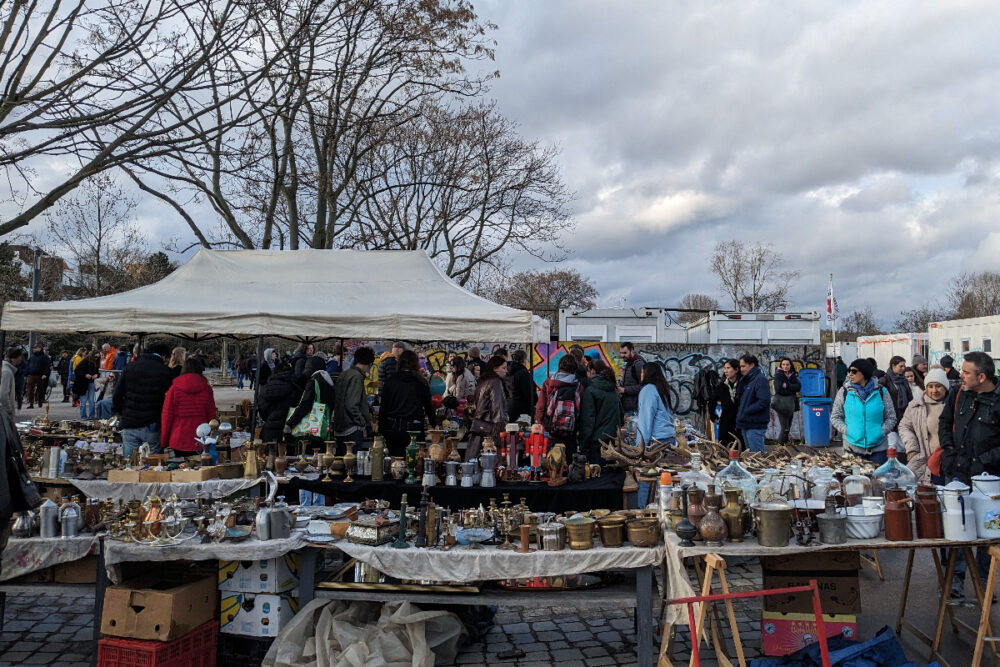
Mauerpark (Photo: Oliver Stallwood)
No longer places where you’ll find people haggling over a rusty sandwich toaster, Europe’s flea markets have been given a major facelift, boosted by no-frills flights and the weekender travel boom of recent decades, and are now a common fixture on the itinerary of city-breakers. And while many of the continent’s flea markets continue to offer not much more than brick-a-bracs and the odd vintage garment, some have become glamorous entertainment venues in their own right.
Shabby chic food trucks peddling takoyaki and empanadas, exotic cocktails, live music, pop-up bars and a host of other enticements now characterise many of the continent’s flea markets – a far cry from the days when an ironic Gwen Stefani T-shirt was the most edgy it got. TravelMag.com have researched them all, taking into account food and drink, music and entertainment, and variety and affordability of the produce and affordability, to bring you a definitive top ten. Grab your favourite tote bag, some oversized shades and plenty of small change. Here we go…
1. Mauerpark, Berlin
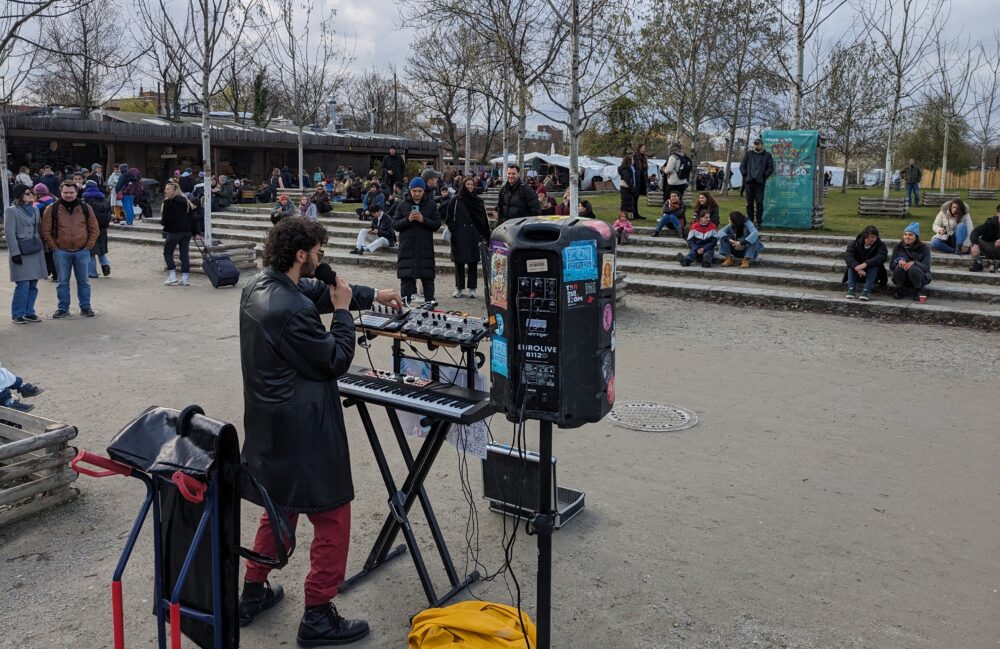
Mauerpark (Photo: Oliver Stallwood)
…and the gold medal goes to Mauerpark Flohmarkt. Located in the bustling district of Prenzlauer Berg, along the stretch of the Berlin Wall once known morbidly as the “death strip”, Mauerpark is an uber-cool flea market if ever there was one. Originally located on a sparse patch of land near the park’s south entrance, Mauerpark Flomarkt has in recent times been treated to a dash of tarmac to make it feel less like Monday morning at Glastonbury. But fear not, this upgrade hasn’t erased its rough and ready spirit. The market is a hotch-potch of vintage clothing, hipsters selling their cast-offs, records, hand-printed t-shirts and broken, landfill-dodging knick-knacks. Each Sunday, the market also doubles as a mini-festival, with drummers, impromptu DJ set-ups, BBQs, club refugees, the bored, the stylish and the down and out, all descending here to escape the impending doom of Monday morning.
Bernauer Str. 63, Berlin
2. Hornstulls Marknad, Stockholm
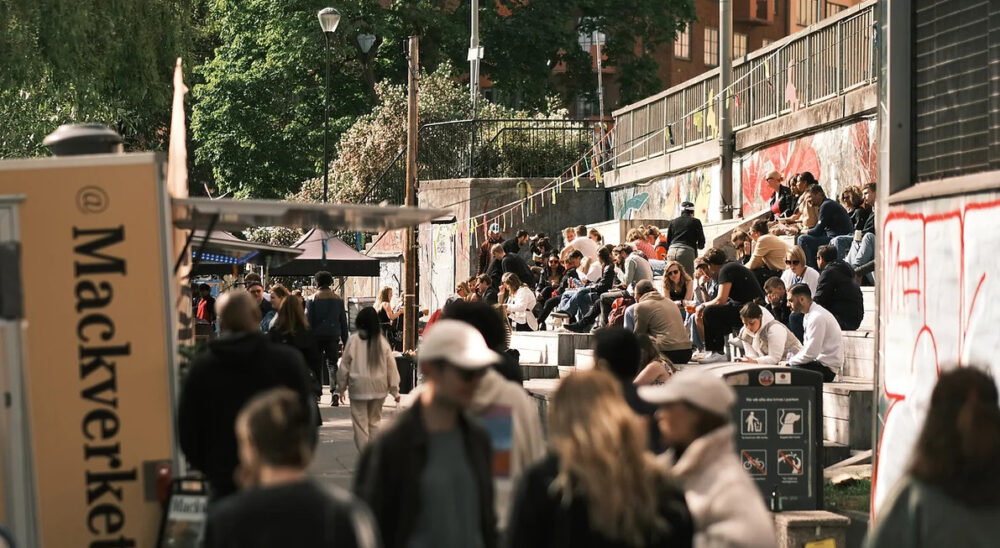
Hornstulls Marknad (Photo: hornstullsmarknad.se)
Coming in a close second is Hornstulls Marknud, a local secret in Stockholm. Taking place in a picturesque location under willow trees on the northern bank of Lijeholmsviken river in the neighbourhood of HornstullIt, this relatively new market is still off the radar of many tourists, but those who do venture here will testify to its cool credentials. Not only is there a good selection of second-hand goods and local handmade designer items, the market also earns kudos for the line of food trucks selling everything from fries to Indian cuisine, as well as the mid-afternoon live music that positively compels spontaneous riverside dancing. Hornstulls Marknad takes place every Saturday and Sunday, from the first weekend of April to the last weekend in September, between 12 and 5pm.
6, Hornstulls strand 4, Stockholm
3. East Market Milano, Milan
Rounding up the podium is East Market Milano. The chic Italian city of Milan is better known for haute couture than second-hand and vintage finds, but East Market Milano does what it can to help shift that perception. Housed in a former aircraft factory, which looks as if Mad Max was the resident interior designer, East Market is the city’s first flea market dedicated to hobbyists and dealers who trade vintage clothes, antiques, old video games, home decor, sneakers, records, and more. Where else could you find a life-size plastic model of ET, a Tyler the Creator vinyl and a Milan street sign all under one roof? Each event pulls in hundreds of exhibitors from all over Italy and over 10,000 visitors. For refreshments, there’s an eclectic Food Market set against top tunes by live DJs.
Via Mecenate 88/A, Milan
4. Midnightbazar, Munich
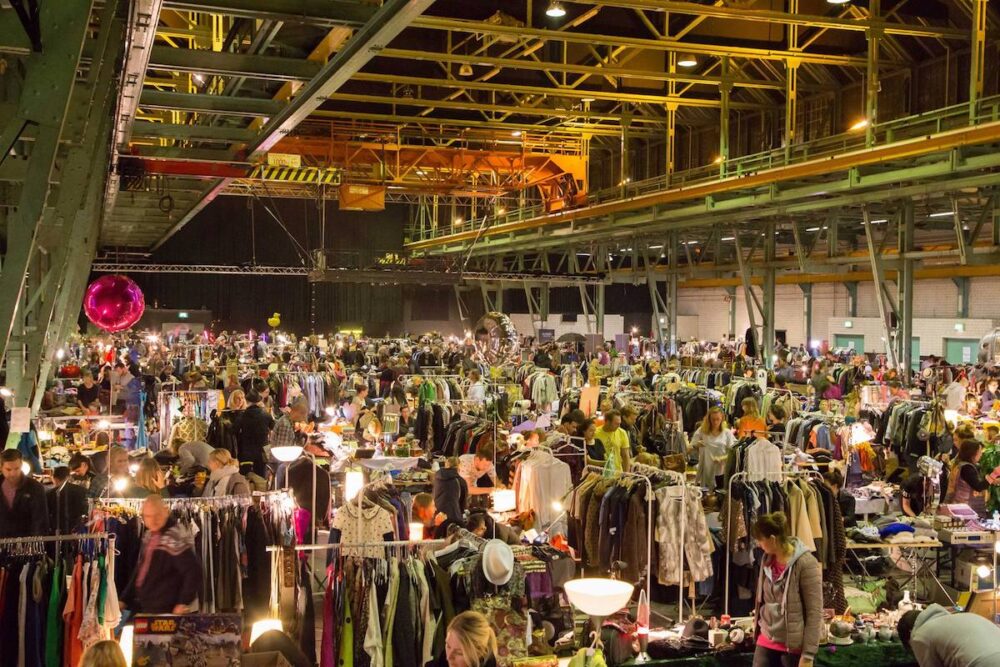
Midnightbazar (Photo: Facebook.com)
Taking place at Munich’s Backstage, an industrial-looking cultural and event space born in the 1990s, Midnightbazar is a vibrant night market. Running from 5pm to 11pm, two or three times a month (best to check the website), it ticks all the boxes for classic flea market ingredients, with hundreds of stalls selling vintage clothing, records and a whole host of knick-knacks, and live music, a beer garden and food trucks on hand for refreshments and general entertainment. In short, Midnightbazar isn’t merely a great night-time market, it’s a great night out full stop. It’s noting, a children’s flea market takes place immediately prior to Midnightbazar, ensuring little ones also get a taste of the action too.
Reitknechtstraße 6, München
5. Puces du Canal, Lyon
It’s no surprise that Puces du Canal has become the second largest flea market in France (after the Braderie de Lille) in just a few years since opening. Attracting nearly 10,000 visitors to the district of Saint-Jean on the outskirts of Lyon, it offers an atmosphere more akin to a festival experience than a traditional flea market, with art, bespoke design, toys, antiques, vintage fashion, home deco and more, alongside several restaurants and bars, a bakery, a florist and a brewery. As is the general rule of thumb when in France, the key here is to take your time. Or if in doubt, just watch the locals and do as they do – including regular stops for a well-earned glass of Burgundy.
5 Rue Eugène Pottier, Villeurbanne
6. We Love Markets at the Digital Hub, Dublin
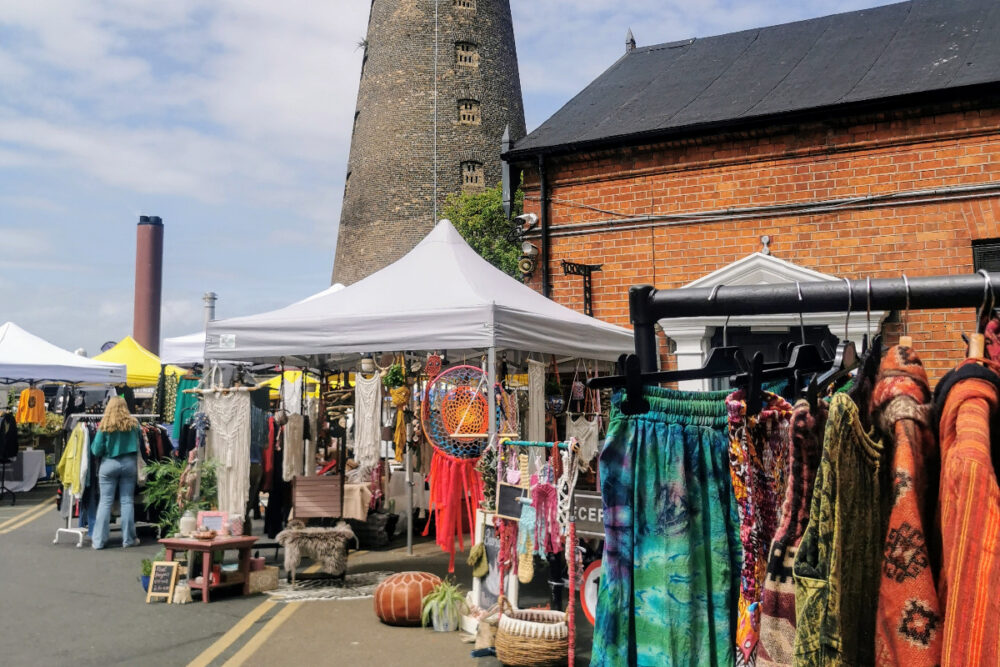
We Love Markets (Photo: welovemarkets.ie)
When you hear that co-founders Emma Brereton and Tara McGuinness met on a dancefloor at a beach party you know their flea markets are going to be fun. The pair are the brains behind We Love Markets, a new curated flea market – think less piles of unwanted fast fashion, more vintage must-haves – which, although only two years old, has already become one of the best things to do on a Sunday in Dublin. It’s buzzing and unashamedly a hipster magnet, with rows of stalls (around 80 in total) featuring vintage fashion, bric-a-brac, records, crafts, furniture and local small businesses selling artisanal wares. It all takes place at The Digitial Hub, a cluster of tech and digital media companies in Dublin 8, one of the city’s trendiest neighbourhoods. The market also offers delicious local food, with the smell of Irish cheddar and spring onion wafting through the air from stands selling Irish hot potatoes, as well artisanal baked goods by Tania’s Kitchen, a local baker.
The Digital Hub, Dublin 8, Dublin
7. Les Puces de Saint Ouen, Paris
Situated in the north of Paris, near the banks of the River Seine, the Saint Ouen flea market is an icon of Parisian second-hand scouring. The story goes that rag and bone men in the 1870s were driven out of the city centre and found a wasteland on which to set up a market and offload their brocante (second-hand) wares. This became Les Puces de Saint Ouen, these days less a market than a whole village of odds and ends. There are 14 markets joined together, each with a different identity, interwoven with labyrinthine flea streets, with everything from antique furniture and thrift stores, to old street lights and broken electrical items. Refuelling comes in the form of authentic Parisian bistros serving up everything from rich onion soup to garlicky beef entrecote.
110 Rue des Rosiers, Saint-Ouen-sur-Seine, Paris
8. Brick Lane Market
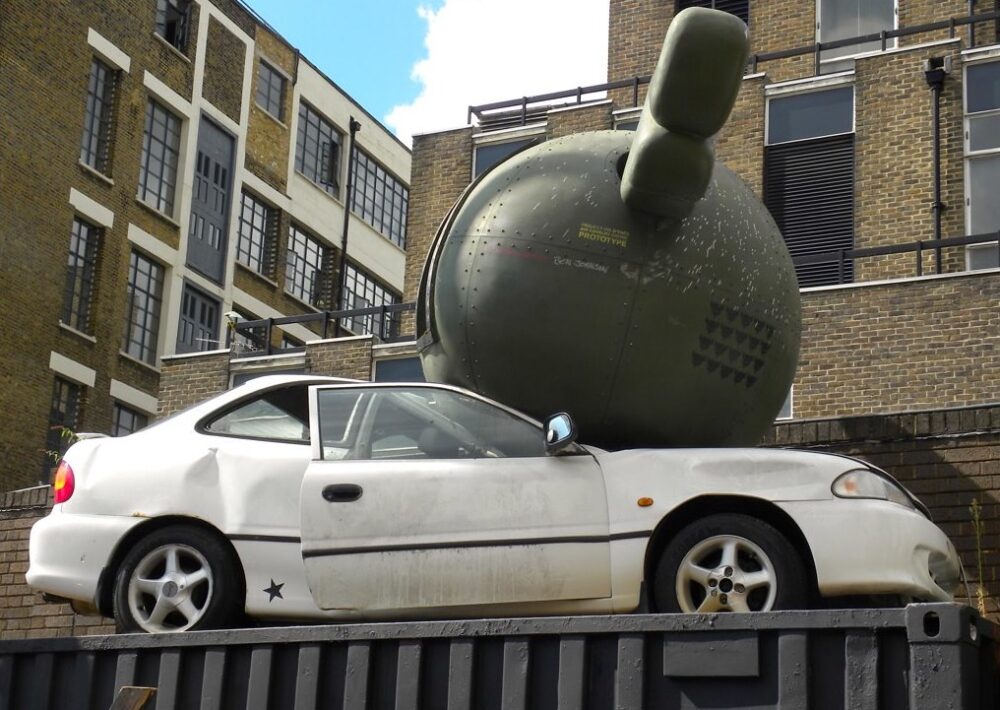
Brick Lane (Photo: JasonParis via Flickr.com / CC BY-SA 2.0)
East London’s Brick Lane has gone on what the youngsters today call a ‘journey’, evolving from one of the capital’s working class backbones into a hangout teeming with Nathan Barley-esque media types. At the market these days, which actually includes five separate markets known as The Truman Markets, the local produce may be less of the allotment potatoes variety and more organic urban honey. But on Sundays it’s still the perfect place to wander around and pick up second-hand items, tasty food, records and repairable bits and pieces. The Sunday Upmarket, a food hall stuffed full of street food and a smattering of curated vintage stalls, is worth a look. So too is the Vintage Market, with second-hand clothing galore, whether it’s Wu Tang jeans or a Madonna-spec denim jacket and cowboy boots combo. But the best part of this flea market is the impromptu stalls selling everything and anything you didn’t know you didn’t need. It’s lively, fun and a place to people watch and be seen.
9. Hippiemarkt Las Dalias, Ibiza
With its reputation for techno and house parties, as well as exotic cocktails and upmarket cuisine, it’s easy to forget that Ibiza has a long-standing hippy culture too. The flower power movement brought many free thinkers to the Spanish island in the 1960s and that vibe has become ingrained in its soul just as much as dodgy foam parties. If it’s difficult to find it in one of the island’s mega clubs, head to the legendary hippy market, Las Dalias, which has apparently been there since 1954, for handmade items, vintage clothing and a slice of flower power. Of course, this being Ibiza, there are also regular DJ sets and live music sessions later in the day. In summer there’s a night market, too.
Las Dalias, San Carlos, Ibiza
10. LX Factory Sunday market, Lisbon
It’s commonly known that abandoned factories are catnip for creative trendy types – you simply don’t get one without the other. The LX Factory Lisbon, which sits in the mighty shadow of the 25th of April Bridge, is a case in point – a one-time derelict industrial complex that’s now a hive of workspaces, bars and restaurants. While there are plenty of good flea markets in Lisbon, the Sunday market at LX Factory is one where you can spend the day sifting through records, vintage gems and handmade artisan goods for the first hour or so, then retiring to a nearby graffiti-ed coffee shops for a pastel de nata before checking out one of the city’s many electronic music events.
R. Rodrigues de Faria 103, Lisbon